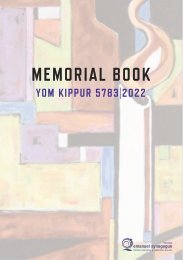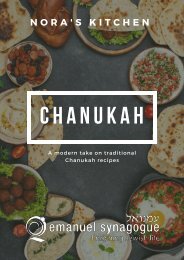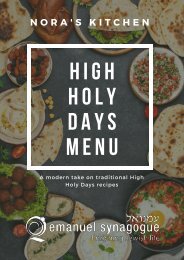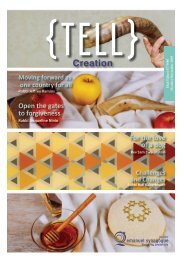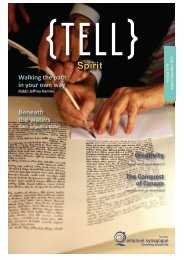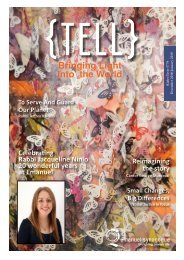You also want an ePaper? Increase the reach of your titles
YUMPU automatically turns print PDFs into web optimized ePapers that Google loves.
us to use our freedom to learn to<br />
understand who we are and can be<br />
as a people. Now, with the rise of<br />
fundamentalism around the world,<br />
including among Jews, the privilege<br />
of learning becomes an imperative<br />
so that we can embrace our power<br />
to create the future of our people.<br />
At Emanuel Synagogue, and in<br />
pluralist communities around<br />
the world, we use our freedom to<br />
empower and include others in<br />
our unfolding story. We know we<br />
stand authentically in the chain of<br />
tradition, in the transmission of our<br />
deepest held values and practices.<br />
Yes, freedom gives us the ability to<br />
walk away from our heritage, our<br />
culture, our traditions, our values<br />
and our way of life, to leave it all<br />
behind and become like everyone<br />
else. But freedom also gives us the<br />
opportunity to know that as human<br />
beings we have the opportunity to<br />
live a fully conscious life, enhanced<br />
and guided by that very heritage<br />
and its visionary way of life. I look<br />
forward to walking this latter path<br />
with you at Emanuel Synagogue.<br />
{FINDING TRUE FREEDOM}<br />
Rabbi Jacqueline Ninio<br />
Every year as we approach Pesach<br />
we begin to speak about freedom.<br />
Ask any child in the preschool<br />
what Pesach celebrates and<br />
they will answer, “that we were<br />
slaves and then we were free”.<br />
Look at any of the myriad of<br />
haggadot, and they all emphasise<br />
freedom - its importance and its<br />
significance. In fact, the one we<br />
use at my house is called “Feast<br />
of Freedom.” Yet while we speak<br />
about freedom, as I scrub and<br />
clean and think about all the<br />
rules and regulations, I wonder<br />
about the nature of this freedom<br />
we are celebrating. Seneca, the<br />
first century Roman philosopher<br />
wrote: “Show me a person who<br />
is not a slave. One is enslaved to<br />
passions, a second to profit and<br />
a third to status and everyone to<br />
fear.” Seneca, in the first century<br />
wrote something which is still true<br />
today. For all our talk of freedom,<br />
we are possibly still enslaved in the<br />
same way as our ancient brethren.<br />
How many of us are truly free?<br />
How many of us feel trapped<br />
within the bondage of others, the<br />
oppression of our work, driven<br />
TRANSFORMATIVE LEARNING<br />
to move ahead, to be<br />
better, to be more, to<br />
have more; we are on<br />
a treadmill - and it is<br />
so hard to get off! Even<br />
though we are not<br />
enslaved as our ancestors<br />
were, thank God, we are all slaves<br />
in one form or another. So, is<br />
Pesach really to celebrate our<br />
liberation from such bondage? Is<br />
Pesach about personal freedom,<br />
releasing ourselves from those ties?<br />
and if so, why so many rules and<br />
regulations? Why celebrate when it<br />
seems we are not really free at all?<br />
I read an incredible lecture presented<br />
by Rabbi Jonathan Sacks, in which<br />
he offers an insight into how the<br />
Torah and then Jewish tradition<br />
views the notion of freedom. He<br />
begins by looking at the language<br />
we use. When we speak of freedom<br />
in the Haggadah, or even the name<br />
for Pesach, z’man cheruteinu, the<br />
time of our freedom, the word<br />
used is from the root chaf reish taf,<br />
cherut. We talk in the haggadah<br />
of “me-avdut le-cheirut,” “from<br />
slavery to freedom.” But the word<br />
cheirut does not appear in the Torah<br />
at all. When the Torah speaks of<br />
freedom it uses the word chofesh/<br />
chofshi, which is the Modern<br />
Hebrew word for holiday. In the<br />
Torah, it is not referring to a nice<br />
long weekend break, or a two-week<br />
7



